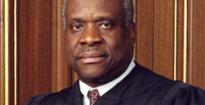Justice Thomas' extraordinary opinion in McDonald v. Chicago
 In an article for Reason, Damon W. Root writes about Clarence Thomas' concurring opinion in McDonald v. Chicago. Justice Thomas gives a strong and impassioned historical overview of the 2nd amendment as a means for African Americans to defend themselves from racists:
In an article for Reason, Damon W. Root writes about Clarence Thomas' concurring opinion in McDonald v. Chicago. Justice Thomas gives a strong and impassioned historical overview of the 2nd amendment as a means for African Americans to defend themselves from racists:
“It’s my understanding that we had almost 100 years of lynching and activity in the South by the Knights of Camellia and the Ku Klux Klan, and this was a reign of terror and the cross was a symbol of that reign of terror,” Thomas told Deputy Solicitor General Michael Dreeben during oral arguments. In his dissent a few months later, Thomas dug even further into American history, citing sources ranging from a scholarly encyclopedia of the Ku Klux Klan to contemporaneous reports of cross burnings, lynchings, and other acts of racist terrorism to make the case that cross burning was an act of thuggish intimidation that deserved no protection under the First Amendment.
It wasn’t the first time Clarence Thomas weighed in on America’s long and bloody history of racism—and it wouldn’t be the last. In his concurring opinion last month in the landmark gun rights case em>McDonald v. Chicago<, Thomas held that the right to keep and bear arms is fully applicable against state and local governments via the Privileges or Immunities Clause of the 14th Amendment. In the process, Thomas provided a sweeping history of the 14th Amendment’s roots in the anti-slavery movement and its original purpose as a shield against the predatory actions of the former Confederate states, who sought to deny the civil, political, and economic rights of black Americans and their white allies—including the right to keep and bear arms.
This focus on African-American history left more than a few liberal commentators scratching their heads. Washington Post columnist Courtland Milloy—who recently said he would like to “knock every racist and homophobic tooth” out of the mouths of Tea Party activists—was shocked by the stirring words of the conservative justice. “This was no muttering from an Uncle Tom, as many black people have accused him of being,” Milloy wrote, perhaps alluding to his own previous unguarded thoughts about Thomas. “His advocacy for black self-defense is straight from the heart of Malcolm X.”
Had he followed Thomas’ career more carefully, Milloy would have discovered that the justice’s views stretch back even further than that. Thomas’ concurrence in McDonald draws from a long and uninterrupted line of civil rights activists who preached the virtues of armed self-defense. The great abolitionist leader Frederick Douglass, for instance, who famously urged President Abraham Lincoln to arm the liberated slaves against their former masters, was an outspoken champion of gun rights in the decades after the Civil War. American liberty depends upon “the ballot-box, the jury-box, and the cartridge-box,” Douglass wrote in his third and final autobiography, em>The Life and Times of Frederick Douglass< (1881). Without these privileges and immunities of citizenship, “no class of people could live and flourish in this country.” Blacks therefore required all three.
Click here to read more.

